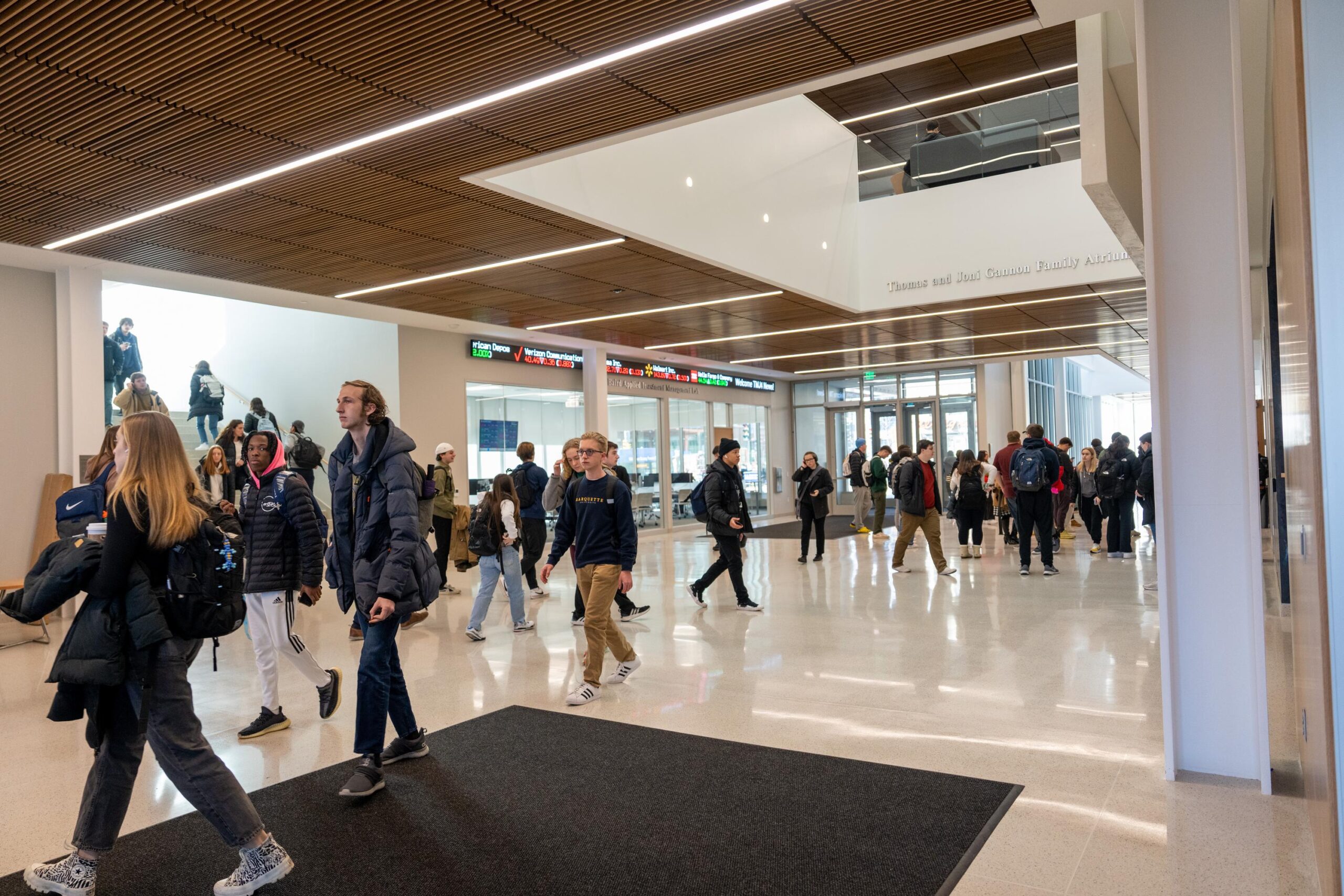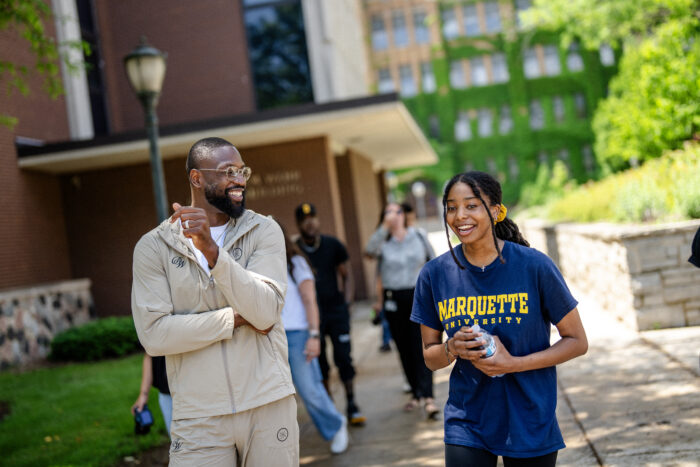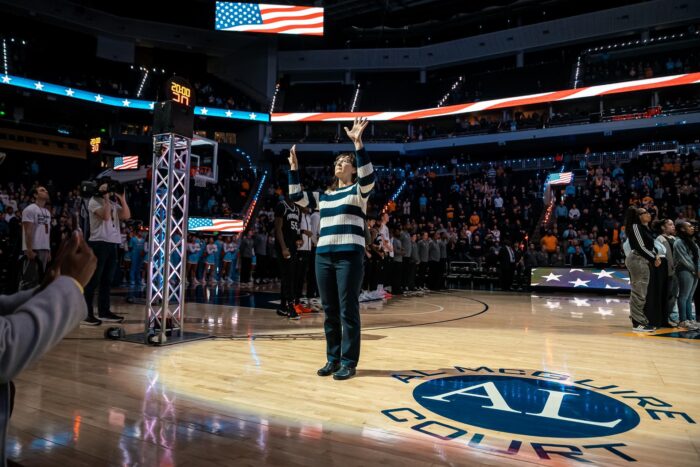Joe Zurawski had a six-figure problem on his hands.
As an operating partner of the venture capital firm that manages the Marquette University Kohler Center fund, or MUKC, Zurawski identifies and invests in early-stage startup companies that have Marquette student, faculty or alumni leadership. The founders of one such company that received a substantial investment from MUKC had just informed Zurawski of their intention to possibly exit or divest the business.
Zurawski and the fund had a choice: let the business run its course or potentially take it over and try to turn it around. The latter would require another hefty investment.
It’s a decision that even the most experienced fund managers don’t make alone. Zurawski had help, though, in the form of three Marquette business students, all part of the Interchange Project.
A pilot program under the umbrella of Innovation Alley, Marquette’s cross-disciplinary innovation leadership initiative, the Interchange Project is meant to foster closer relations between the university and industry partners, while also allowing students to gain experience in dynamic business environments.
“To determine business viability, the students had to perform extensive research with minimal market data, and in the end deliver the necessary information for a real-life business, with real business owners and real money invested,” Zurawski says.
“Students are so used to getting a syllabus,” says John Knapp, executive director of Innovation Alley. “Here, they sit down and write the syllabus. They tell us how they’re going to work together and solve a business challenge.”
Businesses that want to be involved with the Interchange Project will come to Knapp with a problem they need solved or an idea they want tested. Knapp will then recruit a small group of students with the requisite skills. At the first meeting, students are given the desired outcome and an approximate timeline. Then, those students take over.
“We were our own managers for this project,” says Shriya Mishra, a master’s student in economics. “We were given the freedom to follow our instincts and make decisions based on our own judgment.’”
The open-ended format is designed to bridge the gap between classroom learning and workplace experience. Normally, students in classes have a specific learning outcome that professors want them to achieve and a fixed series of tasks meant to guide them toward that outcome. When those students graduate and get jobs, they often must learn how to apply their knowledge in a self-directed environment. Interchange students start that transition earlier, which makes them more prepared to enter the workforce.
In the case of Mishra’s group, they instantly had to confront a flurry of questions. How often are we going to meet and in what format? What information don’t we have and how are we going to get it? What’s a reasonable output to expect, given a timeframe of just several weeks to work on the project? Every answer came from the students.
“The Interchange Project develops a true, professional business acumen,” says Dan Montague, vice president of emerging technologies at Potawatomi Business Development Corporation and a program partner. “It teaches the students who hadn’t been exposed to the business environment what the level of expectation is in terms of the quality and clarity of communication.”
Getting comfortable with ambiguity is just one of the ways students benefit from the project’s unique structure. The teams Knapp assembles are usually composed of students with different majors, both to better address a client’s needs and to further differentiate it from what students do for their classes. So far, Interchange projects have engaged undergraduate and graduate students from four of Marquette’s seven colleges.
“There are lots of classes in higher education that have students working with external partners, but there are usually only people representing one college or one department in the room,” Knapp says. “While that’s important for gaining knowledge, most applied environments are not going to be like that. In the business world, you have people from multiple disciplines sitting at the same table all the time. We wanted to get students used to that idea.”
Each project has an adviser attached to it to support and mentor students as they move through the problem-solving process. For the MUKC project, Zurawski talked about previous market analyses he’d done and the process of conducting one. However, unlike a similar classroom assignment, students in the Interchange Project were not required to use Zurawski’s suggestions, nor were they given any grades or learning outcomes — just hourly pay, the same as a job.
“We gave them a framework of what we were trying to do; not a dictation, just a structure for thinking about our problem,” Zurawski says. “The only other thing I gave them in the beginning was a list of questions we needed to answer.”
“When you work in a big firm, sometimes you give suggestions and your clients don’t really implement them,” Mishra says. “I really wanted to work with the Interchange Project because I knew our work was going to make a difference.”
The final product is different for each project. For one group, it was a mobile app for the manufacturing company Kohler. For another, it was a thorough investigation of the electric vehicle ecosystem for the Potawatomi Business Development Corporation, from market dynamics and value chain mapping to the legislative landscape.
For Mishra’s group, the final product was a presentation to MUKC investors, fund managers and Marquette Business leaders on the product’s market potential and what it would take to grow revenue. Prior to the presentation, Zurawski coached the group on how to assemble a slide deck that complied with professional standards and consulted the students on their conclusion.
“In the end, we’re talking about a real-life business with a time-sensitive decision, so we had to have an answer one way or another,” Zurawski says.
After the presentation and Q&A, MUKC fund founder Mark FitzGerald told the students their analysis was thorough and professional, and he would like to have this type of research in the future during the due diligence process.
This feedback mirrors the experience other companies have had with the Interchange Project, making Knapp optimistic that the project can expand in the upcoming academic year. He envisions Interchange as a place that provides something valuable to all its stakeholders: pay and work experience for students, agile problem-solving resources for companies, and a tighter bond with the business community for Marquette.
“We want to work with mission-aligned people on multi-dimensional projects that create real solutions,” Knapp says. “I’ve been so encouraged to see Interchange students taking ownership of challenges that are usually reserved for experienced practitioners. These projects are hard, but Marquette students prove time and time again that they can do hard things.”
If you or your company would be interested in engaging Marquette University students for an Interchange Project, please contact John Knapp at john.knapp@marquette.edu.
Related content:



